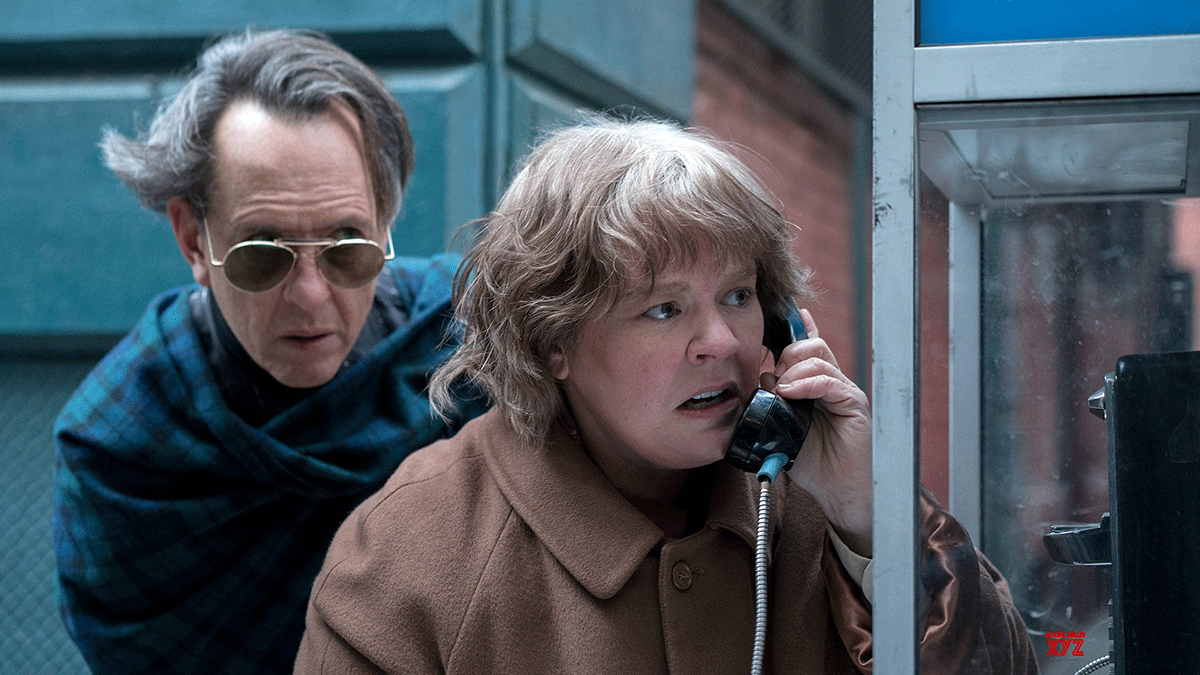Most movies about writers revolve around someone glamorous or outrageous whose oversized personality spills over into their body of work. (Like the recent biopics about Oscar Wilde and Colette.) Lee Israel was not the glamorous kind of writer. But her largely unexceptional writing career took one detour interesting enough to attract filmmaker Marielle Heller, whose film Can You Ever Forgive Me? is based on Israel’s autobiographical memoir, published in 2008.
And who is Lee Israel? A longtime staff writer a The New Yorker, toiling away for long hours in complete anonymity, she had published a few biographies of bygone celebrities like Katharine Hepburn and Tallulah Bankhead, and cosmetics icon Estée Lauder. Her books were never successful enough for her to quit her day job, but when she was fired, she found a more lucrative career in literary forgery—specifically, forging letters from famous authors and selling them to unwary dealers.
The movie begins in 1991, with Lee (Melissa McCarthy) fired from her job for her foul mouth. Worried about her ailing cat, and prodded for back-rent owed to her landlord, she’s drowning her sorrows in scotch and soda when she meets Jack (Richard E. Grant) in a bar. With no known address or employment, but plenty of style, Jack gets by on wits alone, and the occasional tumble with a handsome young waiter. He becomes Lee’s drinking buddy and confessor.
Advised by her agent (a nifty cameo by Jane Curtin) that nobody cares about the once-famous people she writes about and to find a new line of work, Lee is stubbornly researching her next biography subject—vaudeville comedian Fanny Brice—when an authentic letter from Brice falls out of the dusty pages of a library book. Lee takes the letter to rare book dealer, Anna (Dolly Wells). Anna is interested, but the content is a little bland, so Lee goes home, jazzes it up with a snappy P.S., and brings it back to Anna, who buys it on the spot.
Soon, Lee is buying vintage typewriters at junk stores and fabricating completely fake letters from famous wits like Dorothy Parker and Noel Coward, copying their signatures in pen over a lightbox. Memorabilia dealers eat them up. At last, Lee has discovered a lucrative market for her work.
Annoying little details sometimes trip up the story. When Anna buys that first Brice letter, wouldn’t she recognize it as the same letter she rejected before, with a suspicious addition? For that matter, wouldn’t all the three or four dealers to whom Lee routinely sells her forgeries be more suspicious of where she was getting them? In real life, she might have widened her pool of buyers (I don’t know if she did), but in the movie, she just keeps taking her bogus letters to the same eager dealers—until the FBI intervenes.
While the real-life Israel was a middle-aged Jewish woman, Lee in the movie is robbed of any ethnicity. (She doesn’t even talk with a particularly New York accent.) She’s been turned into a vehicle for McCarthy, a generic frump in a bad haircut and shapeless clothes. Yet McCarthy is quietly affecting in the role, broadening her range beyond the madhouse comedies for which she’s best known.
But the movie may depend too much on McCarthy’s underdog popularity to sell the character’s less pleasant aspects. (At a swanky literary party, Lee steals a warm coat from the cloak room, and she plays phone pranks worthy of Bart Simpson.) We begin to see why her life is so solitary, although it’s revealed she once had a relationship with another woman (Anna Deavere Smith, in another cameo), who left because she felt the prickly Lee was pushing her away.
Still, the movie’s epiphanies work well—as in the moment Lee realizes she’s done the best work of her career in other authors’ voices. And McCarthy’s curmudgeonly Lee and Grant’s fizzy Jack make a delicious odd couple. Their friendship is the emotional lodestone by which the viewer can navigate this often twisted and cynical tale.
CAN YOU EVER FORGIVE ME?
**1/2
With Melissa McCarthy and Richard E. Grant. Written by Nicole Holofcener and Jeff Whitty. From the book by Lee Israel. Directed by Marielle Heller. Rated R 106 minutes















I thought the movie tried too hard to make Lee Israel a sympathetic character when in fact her behavior showed her to be a criminal and an ethics-less swindler. Yes, treated poorly by employer, down on her luck, low on finances. Not an admirable person to me, but well-played by both leads.